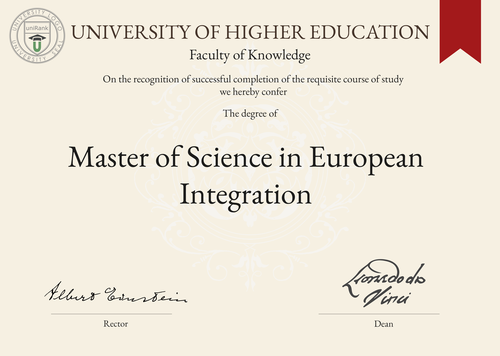
Master of Science in European Integration (MSc in European Integration)
Guide to University Programs/Courses
Master of Science in European Integration (MSc in European Integration)

Program/Course Name
Master of Science in European IntegrationProgram or Degree abbreviation:
MSc in European IntegrationDuration Range
Varies by country and university, typically 1-2 yearsTuition range:
Varies by country and university, typically €5,000-€20,000 per yearOverview
The Master of Science in European Integration program is designed to provide students with a comprehensive understanding of the European Union and its integration processes. It covers various aspects of European politics, law, economics and culture, equipping graduates with the knowledge and skills necessary to work in European institutions, international organizations, or pursue further academic research in the field.Curriculum Overview by Year
The curriculum is structured to provide a multidisciplinary approach to European integration. In the first year, students typically study core courses such as European History, European Law, European Economics and European Politics. The second year allows for specialization through elective courses, research projects and internships.Key Components
The key components of the program include in-depth study of European institutions, policies and decision-making processes. Students also gain a solid understanding of the legal, economic and political frameworks that shape European integration. Additionally, the program emphasizes critical thinking, research skills and intercultural competence.Career Prospects
Graduates of the Master of Science in European Integration program have a wide range of career opportunities. They can work in European institutions, such as the European Commission or the European Parliament, as policy analysts, researchers, or advisors. Other career paths include positions in international organizations, government agencies, think tanks, or consultancy firms specializing in European affairs.Salary Expectations
Salary expectations for graduates of the program vary depending on factors such as the chosen country, the specific job role and the level of experience. Generally, salaries in the field of European integration can range from €30,000 to €70,000 per year, with potential for higher earnings as one progresses in their career.Conclusions
It is important to note that the duration, tuition fees, curriculum, key components, career prospects and salary expectations of the Master of Science in European Integration program can vary depending on the chosen country or location of study, as well as the chosen university. Prospective students are encouraged to research and compare different programs and institutions to find the best fit for their academic and career goals. Visitors interested in pursuing this specific degree can utilize the uniRank World Universities Search Engine to explore universities offering the Master of Science in European Integration program worldwide.World Universities Search Engine
search for Master of Science in European Integration (MSc in European Integration) and add the Location (country, state etc.) or specific University you are interested in studying at.
Query examples:
- Master of Science in European Integration (MSc in European Integration) United States
- Master of Science in European Integration (MSc in European Integration) United Kingdom online
- Master of Science in European Integration (MSc in European Integration) Australia international students
- Master of Science in European Integration (MSc in European Integration) University of California
- Master of Science in European Integration (MSc in European Integration) University of London tuition fees
- Master of Science in European Integration (MSc in European Integration) University of Sydney scholarships